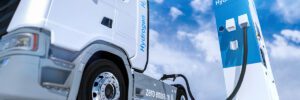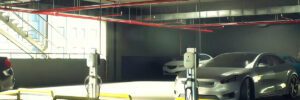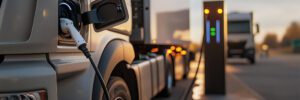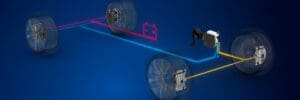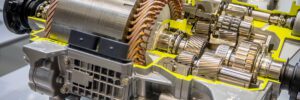The U.S. Department of Energy (DOE) has awarded $7.4 million to seven projects to develop medium- and heavy-duty electric vehicle (EV) charging and hydrogen infrastructure plans across 23 states. The projects span the country and address the drayage, regional haul and long-haul sectors.
The seven projects receiving the money are CALSTART’s East Coast Commercial ZEV Corridor, Cummins’ MD-HD ZEV Infrastructure Planning with Focus on I-80 Midwest Corridor, GTI Energy’s Houston to Los Angeles (H2LA) I-10 Hydrogen Corridor Project, Los Angeles Cleantech Incubator’s First to Last Mile: Creating an Integrated Goods Movement Charging Network around the I-710 Corridor, National Grid’s Northeast Electric Highways Study, Rocky Mountain Institute’s San Francisco and Bay Area Regional Medium- and Heavy-Duty Electrification Roadmap, and Utah State University’s Wasatch Front Multi-Modal Corridor Electrification Plan, Greater Salt Lake City Region.
Secretary of Energy Jennifer Granholm said, “A clean transportation sector requires vast investments across the entire industry, including to decarbonize the trucks that move our goods and building more charging ports to get those trucks from coast to coast.”
The projects funded in this round will help create a strategic planning effort to spur the deployment of commercial medium- and heavy-duty charging infrastructure, develop a two-phase medium- and heavy-duty EV charging and hydrogen fueling plan for the Midwest I-80 corridor, create a plan for an investment-ready hydrogen fueling and heavy-duty freight truck network from Houston to LA along I-10, create a plan for infrastructure solutions at industrial facilities and commercial zones along freight arteries feeding into Southern California’s I-710 freeway, forecast EV charging demand at traffic stops on freight corridors across nine states in the Northeast, create a roadmap for charging infrastructure to support the full electrification of three key trucking market segments in the Bay Area of California, and develop an action plan to improve air quality in the underserved communities most impacted by high-density medium- and heavy-duty traffic in the greater Salt Lake City region.
FAQ
Q1: Are electric car batteries recyclable?
A1: Yes, electric car batteries are recyclable.
Q2: Are electric car chargers free?
A2: It depends on the charger and the location. Some electric car chargers are free, while others may require a fee.
Q3: Can electric car batteries be rebuilt?
A3: Yes, electric car batteries can be rebuilt with the right tools and knowledge.

